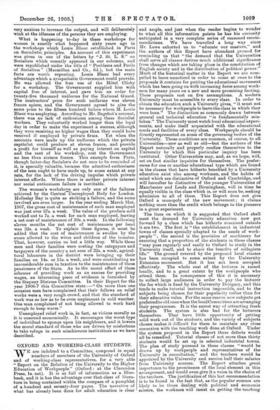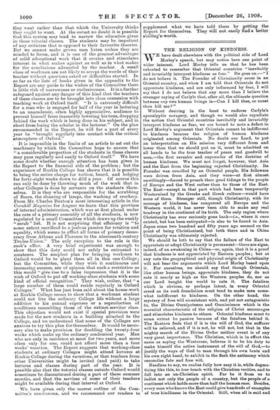OXFORD AND WORKING-CLASS SIX DENTS.
WE. are indebted to a Committee, composed in equal numbers of members of the University of Oxford and of working-class representatives, for a very able "Report on the Relation of the University to the Higher Education of Workpeople " (Oxford : at the Clarendon Press, is. net). It is as full of information as a Blue- book, and it is has the advantage over that class of litera- ture in being contained within the compass of a pamphlet of a,hundred and seventy-four pages. The narrative of what has already been done for adult education is clear and ample, and just when the reader begins to wonder to what all this information points he has his curiosity anticipated in a very complete series of reasoned recom- mendations. We have travelled a long way since Mr. Lowe exhorted us to "educate our masters," and the authors of this Report have abundant ground for reminding us that "the demand that the Universities shall serve all classes derives much additional significance from changes which are taking place in the constitution of English society and in the distribution of political power." Much of the historical matter in the Report we are com- pelled to leave unnoticed in order to come at once to the proposals it contains for putting the educational movement which has been going on with increasing force among work- men for many years on a new and more promising footing. These proposals rest on five assumptions. A modern University must be accessible to every class. In order to obtain the education such a University gives, "it must not be necessary for workpeople to leave the class in which they were born.' The distinction so commonly drawn between general and technical education "is fundamentally mis- taken." The University must watch local educational experi- ments, and make itself acquainted with the educational needs and facilities of every class. Workpeople should be directly represented on some of the governing bodies of the University. These conditions are common, of course, to all Universities—new as well as old—but the authors of the Report naturally and properly confine themselves to the University by which this particular inquiry has been instituted. Other Universities may, and, as we hope, will, set on foot similar inquiries for themselves. The prefer- ences for one or another educational type which are found in the classes that have hitherto benefited by a University education exist also among workmen, and the habits of mind which are distinctive of Oxford and Cambridge, and will hereafter be distinctive of the younger Universities of Manchester and Leeds and Birmingham, will in time be equally visible in the class which is, or will soon be, seeking admission to all of them. This Report does not give Oxford a monopoly of the new movement ; it claims nothing more than the credit which belongs to the pioneers in a great experiment.
The lines on which it is suggested that Oxford shall meet the demand for University education now put forward by a class which has hitherto remained outside it are two. The first is "the establishment in industrial towns of classes specially adapted to the needs of work- people "; the second is the provision of machinery for ensuring that a proportion of the students in these creases "may pass regularly and easily to Oxford to study in the University itself, and to share the benefits of collegiate life." The ground covered by the proposed local classes has been occupied to some extent by the University Extension movement. But it has not been occupied effectively. The whole cost of the lectures is raised locally, and to a great extent by the workpeople who attend them. In consequence of this it is necessary to collect large audiences in order to pay the lecturer the fee which is fixed by the University Delegacy, and this tends to make tutorial instruction impossible, and to the subjects being chosen for their popularity rather than for their educative value. For the same reason new subjects get preferred to old ones when the local Com m ittees are arranging their programmes. It is the surest way of attracting fresh students. The system is also bad for the lecturers themselves. They have little opportunity of getting solid work out of the students, and the variety of subjects chosen makes it difficult for them to maintain any close connexion with the teaching work done at Oxford. Under the system proposed in the Report these defects would all be remedied. Tutorial classes of not more than thirty students would be set up in selected industrial towns. The plan of study pursued in these classes "would be drawn up by workpeople and representatives of the University in consultation," and the teachers would be appointed by the University and receive half their salaries from University sources. The Report attaches great importance to the prominence of the local element in this arrangement, and would even give it a voice in the choice of the teachers. The justification of this last recommendation is to be found in the fact that, as the popular courses are likely to be those dealing with political and economic science, the workmen will insist on getting the teaching they want rather than that which the University thinks they ought to want. At the outset no doubt it is possible that this system may tend to narrow the education given in these tutorial classes. The students may be impatient of any criticism that is opposed to their favourite theories. But we cannot make grown men listen unless they are minded to listen, and it is one of the greatest advantages of solid educational work that it creates and stimulates interest in what makes against as well as in what makes for the conclusions advocated by the teacher. A small class of workmen are not likely to accept the words of their teacher without questions asked or difficulties started. In so far as the lists of books given in the appendix to the Report are any guide to the wishes of the Committee there is little risk of narrowness or exclusiveness. It is a further safeguard against any danger of this kind that the teachers of these classes are to be brought into close connexion with teaching work at Oxford itself. "It is extremely difficult for a man who is engaged for half of the year in lecturing to an unacademic, often highly appreciative, audience to prevent himself from insensibly lowering his tone, dropping behind the work which is being done in his subject, and in short from losing the scholar in the lecturer." On the plan recommended in the Report, he will for a part of every year be "brought regularly into contact with the critical atmosphere of Oxford. '
. It is impossible in the limits of an article to set out the machinery by which the Committee hope to ensure that "a considerable proportion of the students in these classes may pass regularly and easily to Oxford itself." We have some doubt whether enough attention has been given in the Report to the financial side of the problem ; but the experience of Ruskin College has shown that it is possible to bring the entire charge for tuition, board, and lodging for forty-eight weeks down to £52 a year. Of course this can only be done by throwing much of the work that in other Colleges is done by servants on the students them- selves. It is they who are responsible for the scrubbing of floors, the cleaning of lamps, the washing of crockery. From Mr. Charles Buxton's most interesting article in the Cornhill Magazine for August we learn that this province of internal administration, which was at first placed under the care of a primary assembly of all the students, is now regulated by a small Committee which draws up the weekly " scrub " list. It is not surprising that efficiency is "to some extent sacrificed to a jealous passion for rotation and equality, which seems to afflict all forms of primary demo- .cracy from Athens and Florence to the nineteenth-century Trades-Union." The only exception to the rule is the .cook's office. A very brief experiment was enough to show that this duty could not safely be entrusted to amateurs. The simplest plan for bringing workmen to Oxford would be to plant them all in this one College; but the Committee, while they wish it continuous and increasing success, are of opinion that such a restriction as this would "give rise to a false impression that it is the wish of Oxford to put off working-class students with some kind of official recognition." They wish, rather, that "a large number of them could reside regularly in Oxford Colleges." What has just been said about the house-work at Ruskin College seems to show that a workman student could not live the ordinary College life without a large addition to his annual expenses or a reproduction of conditions resembling those of the extinct servitor class. This objection would not exist if special provision were made for the new students in a building attached to the College, and we understand that some of the Colleges are anxious to try this plan for themselves. It would be neces- .sary also to make provision for doubling the twenty-four weeks which make up the ordinary academical year. Men who are only in residence at most for two years, and more often only for one, could not afford more than a four weeks' vacation. The Report suggests that working-class students at ordinary Colleges might attend lectures at Ruskin College during the vacations, or that teachers from other. Universities might be invited (and paid) to take lectures and classes during part of the year. It is possible also that the tutorial classes outside Oxford would sometimes be, discontinued during a part of these summer months, and that the services of some of their teachers might be available during that interval at Oxford. , • We have given only the merest outline of the Com- mittee's conclusions, and we recommend our readers to supplement what we have told them by getting the Report for themselves. They will not easily find a better







































 Previous page
Previous page